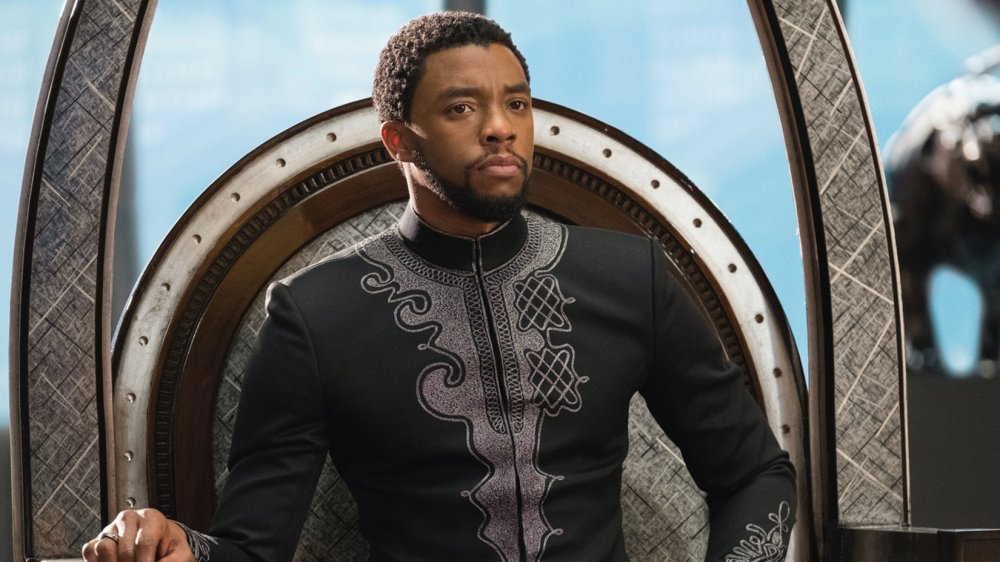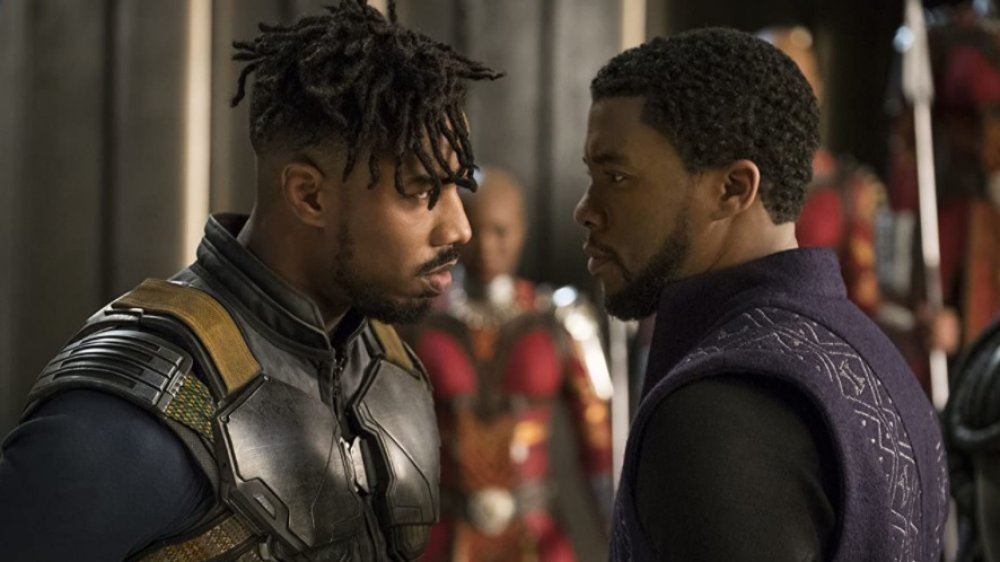Chadwick Boseman Was The Reason For This Epic Black Panther Line
Black Panther is one of Marvel Studios' most successful and beloved films — but it may have turned out quite differently if not for its star, the late, great Chadwick Boseman.
In a recent essay written in honor of his friend for the Los Angeles Times, the film's director Ryan Coogler revealed that Black Panther's most memorable line — the last words uttered by Erik "Killmonger" Stevens, portrayed by Michael B. Jordan — was essentially Boseman's idea. Jordan's amazing performance made Killmonger, a Wakandan raised in America who attempts to claim the throne, one of Marvel's most compelling villains. Boseman's suggestion to revise his final words from the movie's initial drafts made him even moreso.
You'll recall that in the final fight between Killmonger and Boseman's King T'Challa, the former is mortally injured, and in defeat, he has a seat to observe the Wakandan sunset for the first (and last) time in his life. He deems it "beautiful," just as his father, the traitorous prince N'Jobu, had always described it to him. T'Challa, continuing his path of mercy and justice begun during the events of Captain America: Civil War, offers to try to use Wakandan technology to heal his enemy's wounds. Killmonger, though, refuses. "Why, so you can lock me up?" he says. "No. Just bury me in the ocean with my ancestors who jumped from ships, because they knew death was better than bondage."
It must be the most powerful line of dialogue in the entire Marvel Cinematic Universe, and it wouldn't have happened if not for Boseman. In his piece for the Times, Coogler stated that, originally, the script had called for Killmonger to make a different request. "In early drafts of the script, Eric Killmonger's character would ask T'Challa to be buried in Wakanda," Coogler wrote. "Chad challenged that and asked, 'What if Killmonger asked to be buried somewhere else?'"
Chadwick Boseman had a lot of input into T'Challa's characterization
As it turned out, this was far from the only contribution that Chadwick Boseman made to Black Panther's script. As Coogler pointed out, he inherited the casting from directors Joe and Anthony Russo, who had cast Boseman in the role in Civil War. Boseman helped to shape T'Challa's characterization even in that film, going so far as to suggest an important detail which Coogler would basically have no choice but to honor: the native language of Wakanda.
"I asked Nate Moore, one of the producers of the film, about the language [spoken by T'Challa in Civil War]," Coogler recalled. "Nate replied, 'That's Xhosa, [the] native language [of John Kani, who portrayed T'Challa's father T'Chaka]. He and Chad decided to do the scene like that on set, and we rolled with it.' I thought to myself, 'He just learned lines in another language, that day?' I couldn't conceive how difficult that must have been, and even though I hadn't met Chad, I was already in awe of his capacity as an actor."
Coogler went on to say that he would later learn that the decision to make Xhosa the official language of Wakanda was "solidified by Chad," and that the actor "advocated for his character to speak with an African accent, so that he could present T'Challa to audiences as an African king, whose dialect had not been conquered by the West." The director remembered with obvious fondness how, once he agreed to helm Black Panther, he and Boseman would meet during off hours to discuss details and "add depth" to certain scenes. "We talked costumes, military practices," Coogler wrote. "He said to me, 'Wakandans have to dance during the coronations. If they just stand there with spears, what separates them from Romans?'"
Obviously, Boseman was heavily invested in T'Challa, a role which his family referred to as "the honor of his career" after the actor's passing. His thoughtful addition to Killmonger's final moments serves to illustrate how committed he was to ensuring that Black Panther would become, well, what it became: a special film, and nothing less than a landmark in Black cinema.

